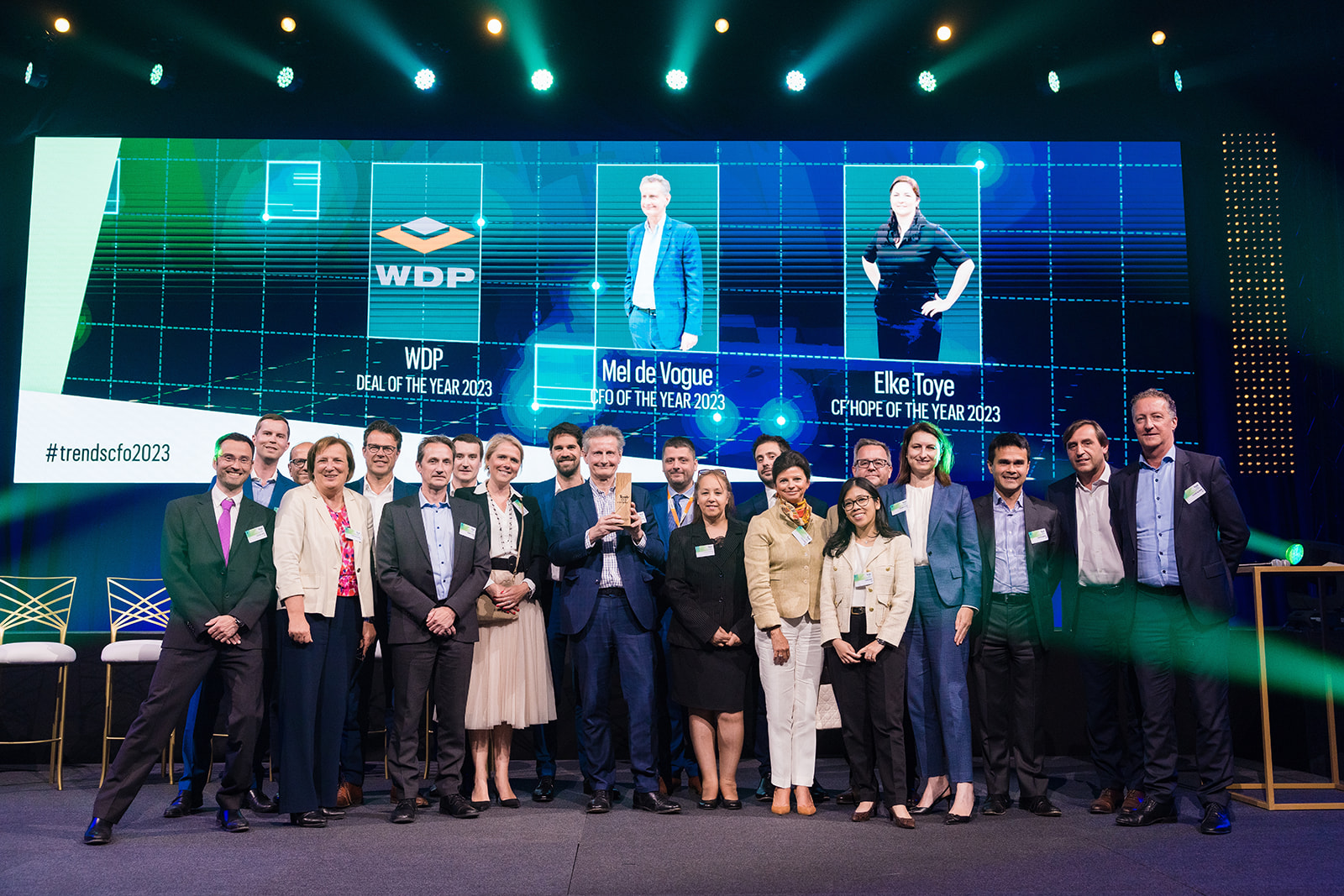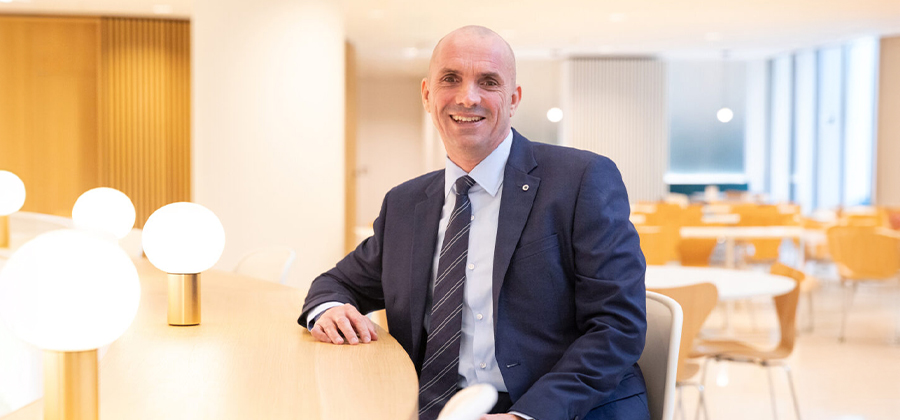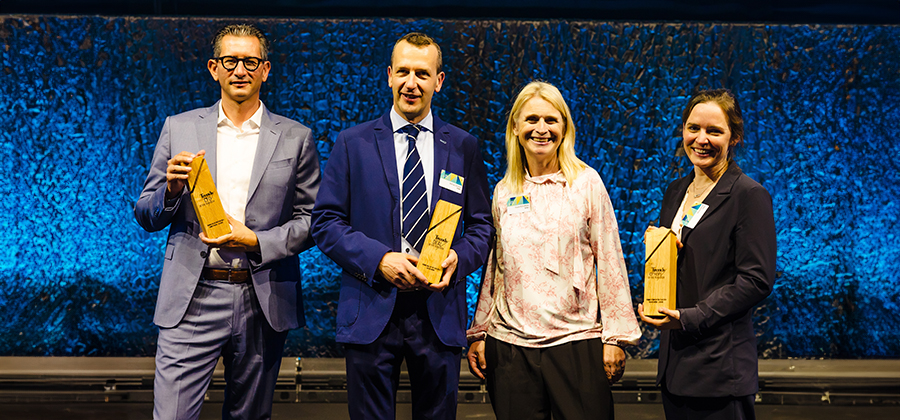Mel de Vogue, CFO of the Etex building materials group, accepted the award at Brussels Expo on 24 May, succeeding Karim Hajjar of Solvay. Mel de Vogue joined Etex as CFO in 2015 and was instrumental in laying the foundation of the new strategy adopted by the company a few years ago.

copyright Leyla Hesna
Focus on sustainability
"The then CEO, Paul Van Oyen, understood very early on that sustainability had to be at the heart of the strategy and that this had to translate into divesting some activities and adding others," says de Vogue. Etex sold a number of businesses and eliminated EUR 1 billion in debt. This strong financial position allowed the company to make a major acquisition last year. Etex put EUR 1 billion on the table to acquire Spanish insulation specialist URSA. The finance department, which employs almost 600 people, played a central role in these operations.
At the same time, de Vogue worked to internationalise and feminise his department. Of the twelve directors, there are now five foreigners and three women.
De Vogue won out over four other strong candidates: Alessandro Mazzocchetti (Odoo), Frédéric Deslypere (Sibelco), Nadine Aerts (SD Worx) and Ann Desender (Barco).
WDP wins the 'Deal of the Year 2023'
For the fourth time Trends also awarded a 'Deal of the Year' award. All mergers, acquisitions and capital operations involving a Belgian company in 2022 were eligible. The most important criterion is the financial and strategic added value that the operation created for the stakeholders.
There were five deals in the running, and the one from WDP emerged as the winner. Last year, the real estate company raised EUR 300 million of fresh money – in difficult market conditions. As a result, WDP can finance its future projects without causing its debt ratio to rise sharply.
Elke Toye of Vyncke is 'CF'Hope of the Year 2023'
With this brand-new award, Trends highlights a young CFO of a promising medium-sized company that is experiencing significant growth. Elke Toye, CFO of the West Flemish family company Vyncke, was the lucky winner.
Vyncke designs industrial incineration plants that convert residual streams into green energy. These are large projects involving large sums of money and long lead times. Financial risk management is therefore Elke Toye’s most important task. In her finance department, the CFO prefers to focus on one major project per year. 2023 is dedicated to preparing reporting on ESG (Environment, Social, Governance) sustainability criteria.
Partnership
Since 2012, BNP Paribas Fortis and Trends have been putting the spotlight on the exceptional qualities of a CFO of a top 500 company in Belgium. Later, the crowning of the 'Deal of the Year' was added, and since this year a 'CF'Hope of the Year' has also been chosen. Virginie Martens, Head of Corporate Coverage Belgium at our bank, was a member of the jury.
Congratulations to the winners and to all the other candidates! Because rewarding and encouraging contributors to our economy is also Positive Banking.
Read the full interview with Mel de Vogue, CFO of Etex and Elke Toye, CFO of Vyncke.
28.10.2024
Webinar US Presidential Elections 2024 - What’s at Stake?
As the US presidential election approaches, the economic stakes are high. The next president and Congress will significantly impact the US economy, influencing GDP growth, inflation, interest rates, and the value of the dollar. These effects will be felt far beyond the US, with important implications for the Belgian economy. Join our discussion, hosted by Karen Casteels (Head of Content at BNP Paribas Fortis), featuring a diverse panel of experts to explore these topics.
- William De Vijlder, Economic adviser to the general management of BNP Paribas, Professor in economics at Ghent University
- Bart Kerremans, Full Professor of International Political Economy and American Politics at the Leuven Institute for International and European Studies (LINES) of the KU Leuven
- Stephanie Rutten, CEO at AmCham Belgium
- Didier Lannoy, Head of Global Markets BeNeLux at BNP Paribas Fortis
06.09.2024
Belgian economy: how to make your company crisis-proof
Summer is over and life – including economic life – is returning to its usual rhythm. With autumn on the horizon, now is a good time to reflect on what the coming months will bring. Koen De Leus, Chief Economist at BNP Paribas Fortis, keeps a close eye on the Belgian and international economy. He looks at current events and shares his insights on how you, as a small, medium or large enterprise, can navigate current and potential future economic crises.

Every social crisis has economic consequences: it's almost a given. During the summer, the winds of crisis blew in from Japan, but in recent years we have endured the coronavirus pandemic, the energy crisis, the Ukraine invasion, the war in Gaza, climate disasters, etc. Each of these crises has had an impact on the global economy, and their effects have gradually made an appearance on our national stage. Koen De Leus wrote a book about this phenomenon: “The New World Economy”. Together with his colleague Philippe Gijsels, he looks back on the economic fallout from this crisis-prone atmosphere.
De Leus: "There are several trends coming together to create the perfect economic storm we're currently experiencing. We're emerging from an era of globalisation, where debts remained under control and an ageing population caused no significant problems. Life carried on quietly. Today, everything is being turned upside down. We are seeing rapid interest rate hikes and inflation, deglobalisation, political uncertainty, climate change, labour shortages, and more.
When asked what our companies need to consider in the coming months, I immediately answer that there are a number of uncertain factors. Take the US elections in November, for example, which could have a huge impact on the economic landscape. The difference in economic policy between Kamala Harris and Donald Trump, regarding his import tariffs, would be extremely significant. The climate transition is also creating uncertainty, as even minor weather irregularities have far-reaching consequences. Anyone doing business with countries facing heatwaves or floods will understand what I’m talking about. Also, an ageing population puts our businesses in a challenging environment of declining labour populations. If the far right were to come to power, we would less likely be in a position to replenish that market with migrant workers."
In addition, our country’s debt problem is also spiralling out of control. De Leus: "In recent decades, we have been saved in this respect by falling interest rates, which meant we had to pay lower charges and could afford more expenses. Unfortunately, those days are now behind us. On the contrary, we are now experiencing higher interest charges combined with rising expenditure. This makes us vulnerable to the austerity measures imposed on us by Europe. Of course, these measures can have a serious impact on our economy, and therefore also on the management of every small, medium-sized or large enterprise in our country."
(Un)certainty
Thus, our country – and by extension the global economy – has slipped from a situation where certainty was the norm for decades to an economic state characterised by uncertainty.
De Leus: "We have moved from 'The Great Moderation' of the past 40 years to 'The Great Chaos'. In our book, we reference another book called 'The Fourth Turning'. Every 80 years, at the end of a full generation, you see significant changes in society internationally. This 80-year cycle corresponds to the average human lifespan. Here we're talking about the passing of the generation that lived through the Second World War. This nearly 100-year-old generation founded institutions such as the IMF, the World Bank and the United Nations. Their aim was – and still is – to prevent another global conflict. Today, these organisations are being challenged by some global players. Everything is being called into question. This is typical of such a ‘Fourth Turning’: a kind of winter period in which a new balance must be sought. Such a period is associated with volatility, so Belgian companies must factor in uncertainty as a fixed value in our economy. The coming months and years will be no exception."
Stand tall
According to De Leus, Europe – and therefore also our country – is facing an economic transformation in which it must stand tall and opt for less dependence: "The European dependence on China today is reflected in the situation with electric cars, for example. For a long time, Europe exported its cars and other technology to China in exchange for a large market; today, this symbiosis no longer applies. China is now exporting electric cars to Europe on a massive scale, making it very difficult for our own manufacturers to compete. The Audi plant in Forest, Brussels is a case in point.
How the United States will react to China as a world economic power in the coming months will depend on the outcome of the elections. That being said, Trump’s protectionist measures have remained in force even under Biden. Europe's drive to reduce its dependence on China, combined with the slowdown in growth there, has driven our economy more towards America in recent years. Exports to America have become much more important for us. However, in doing so, we're just exchanging one dependency for another. So, it would be good to think about how we can fulfil our own economic role more independently.”
Opportunities for companies
Still, De Leus does not want to be the prophet of doom: "Absolutely not. Because companies also function perfectly well in an economic environment marked by uncertainty and volatility. Some companies may struggle with this, especially in combination with the wave of regulation resulting from climate legislation. This, in turn, could lead to a wave of consolidation. So, those who know how to be smart and cautious about these ongoing changes will come out on top. The uncertainty does, however, entail the need for companies to create buffers – to build security and margins into their business environment, both financially and in their procurement policies. Some companies diversify their suppliers because the risk is too high to bet on one horse, or they build up larger inventories. In a world of heightened volatility, just-in-time may have to give way to just-in-case, especially if you want to continue guaranteeing your products to your customers. That costs money, it's true, but in uncertain times like these, inventory is a buffer that mitigates the impact of crises."
The financial market follows
According to De Leus, the financial markets will also have to guard against this uncertainty: "Constantly falling interest rates are a thing of the past. Refinancing corporate loans at lower rates is also behind us. Interest rates will fall in the coming months, but I don't expect us to return to the ultra-low interest rates we had before the coronavirus pandemic. We expect three to four possible rate cuts this year, including those we have already had, and another three or so next year. This will result in an interest rate floor of between 2.25 to 2.5 per cent. But we will not return to zero interest rates, let alone the negative interest rates of the past. In the slightly longer term, interest rates will be higher than in the decade before coronavirus due to structurally higher inflation.
In the new global economy, uncertainty plays a much greater role. Companies should think about hedging against the rise in interest rates that is coming in the next few quarters. The same goes for rising commodity prices that we'll see sooner or later, driven by the huge shortages caused by huge climate investments and electrification. The record copper price of May this year is just a harbinger of what lies ahead in the future. The ‘good due diligence principle’ for the coming months and years is therefore also based on implementing a long-term strategy. In this context, uncertainty is simply one factor among many that companies must take into account and which they can perfectly arm themselves against."
Long term
According to De Leus, our companies can do this best by genuinely and constructively thinking about a long-term strategy that is adapted to the new situation: "This long-term strategy should already be present in the model anyway, but the uncertainty factor should also be added. That is not going to disappear in the coming years. The days of ‘The Great Moderation’ are over. Long-term planning and realistically taking greater volatility into account is good business practice. Smart security in procurement, supply, and at every stage of the chain creates the stability you as a company so urgently need. To some extent, that means taking control of our economic future. And that’s only good news."
10.06.2024
Koen Sticker is the ‘Trends CFO of the Year 2024’
Koen Sticker, CFO of piping and water systems manufacturer Aliaxis, has been named ‘CFO of the Year’. He received the award on 24 May and follows in the footsteps of Mel de Vogue of Etex. Koen Sticker became Aliaxis CFO in 2016 and has contributed significantly to the growth and internationalisation of his company.

Despite a series of previous acquisitions, Aliaxis had never been in the spotlight much. Until last year, when it made a 1.8-billion euro bid on Finnish group Uponor. Aliaxis faced competition from the Swiss company Georg Fischer and was not interested in a bidding war that would be far too expensive, in no small part thanks to the efforts of Koen Sticker.
As CFO, Sticker proved that financial discipline is crucial for a company. Together with former CEO Eric Olsen, he spent a lot of time and effort on preparing the bid for Uponor. “We had decided from the outset what would be the end of the road for us”, he says about the episode. "Emotions can run high in a bidding war, but we pulled the plug at the right time. This was incredibly well received by the banks, credit rating agencies and our shareholders."
SD Worx wins ‘Deal of the Year 2024’
Trends has recently also awarded the ‘Deal of the Year’ for the fifth time. All 2023 mergers, acquisitions and capital operations that involved a Belgian company were eligible for this award. The most important criterion was the added financial and strategic value the operation brings to the stakeholders.
SD Worx was announced as the winner. The company has grown into a wide-ranging HR service provider of payroll, recruitment and selection, talent development, HR consultancy and more. SD Worx ranks fifth worldwide and acquisitions have played a major role in that. An IPO is on the cards some time in the future.
Olivia Doyen is CF'Hope of the Year
With the new ‘CF’Hope of the Year’ award, Trends wants to celebrate a young CFO of a promising medium-sized company that is experiencing significant growth. Olivia Doyen, CFO of construction company Galère, won the award this year.
After leaving university, she started her career with Fortis Investments, but after a few months decided to join Voo. Three years later, the young sales engineer moved to Galère. She has been CFO there since 2017. The panel praised Olivia Doyen for her consistent management of the company’s finances. They also praised her efforts to improve the company’s financial performance and were impressed by her involvement in the merger with the Thomas & Piron group, which was secretly prepared in the course of 2021.
Partnership
BNP Paribas Fortis and Trends have been turning the spotlight on the exceptional qualities of CFOs of the top 500 companies in Belgium since 2012. Later they also added ‘Deal of the Year’ and ‘CF'Hope of the Year’. Virginie Martens, Head of Corporate Coverage Belgium at our bank, was a member of the panel this year.
Warm congratulations to all the winners! The bank is always ready to reward and encourage people and companies that contribute to our economy.
03.04.2024
BNP Paribas Fortis Private Equity becomes shareholder of Stûv
BNP Paribas Fortis Private Equity joins forces with Wallonie Entreprendre by investing capital in Stûv, a leading player in renewable energy heating.
Renewable energy sources
The Walloon company Stûv, based in Bois-de-Villers near Namur, designs, manufactures and markets individual wood and pellet heating solutions in Belgium and internationally. 80% of its production is destined for export.
Over the past two years, Stûv has seen its growth increase sharply. Consumers are increasingly opting for renewable energy sources. There are several reasons for this: volatile energy prices, looming deficits due to Europe’s energy dependence and the impact of fossil energy on global warming.
Ambitious plans
To meet this growing demand, Stûv plans to invest EUR 16 million over the next five years. Three-quarters of this investment will be used to increase and modernise production capacity in Wallonia, while the rest will be to expand their Canadian site. To this end, Stûv welcomes two new shareholders: Wallonia Entreprendre and BNP Paribas Fortis Private Equity. The goal is to double the consolidated turnover.
Strong shareholders
With Wallonie Entreprendre and BNP Paribas Fortis Private Equity, the Namur-based company is bringing two strong shareholders on board. In addition to capital, they both bring a great deal of experience, vision and expertise.
Commenting on the deal, Raf Moons, Head of BNP Paribas Fortis Private Equity said: "We look forward to supporting the ambitious innovation strategy of a Walloon, Belgian and international industrial flagship company. Their social and environmental values also fit nicely with those of BNP Paribas Fortis."
Read the full press release here (only French or Dutch).
